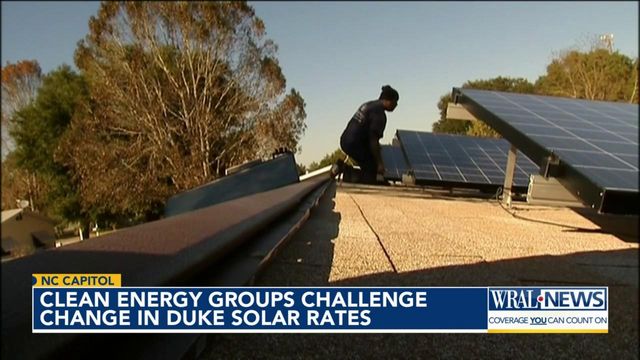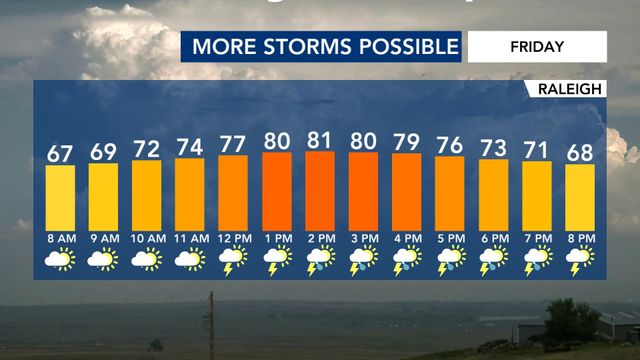New rules will increase energy bills for NC solar customers. Should the courts step in?
Renewable energy advocates were in court Wednesday, fighting against Duke Energy and state regulators over new rules that will raise the energy bills of people and businesses with solar panels.
Nine environmental groups and activists are suing Duke Energy and the North Carolina Utilities Commission, claiming that the commission improperly ignored evidence about the benefits of solar energy, both financial and environmental, when approving the new pro-Duke rules last year. The North Carolina Court of Appeals held oral arguments in the case Wednesday.
For years, North Carolina has been among the leaders nationwide in solar power; in 2023, only three other states produced more solar energy. Tens of thousands of North Carolinians work in the solar industry. But environmental groups and solar companies now worry that will all change due to the new rules.
The rules dictate how much Duke can charge, or pay, solar customers. The arguments Wednesday focused on “net metering,” a process through which utilities pay a flat rate to buy back excess power its solar customers send into the grid.
The new rules will end net metering by 2027 and instead allow Duke to pay different rates at different times of day, with the lowest rates during the day when solar panels are typically producing the most power.
Expert witnesses have said, as part of the lawsuit, that people with solar panels will see their savings on energy bills slashed by about 30% once the new rules go into effect.
Duke says that paying solar customers less in the future will level the playing field for all other non-solar customers, who it says have been paying extra to help subsidize solar users.
One industry's profit is another's loss
Power companies nationwide have been pushing for years to eliminate net metering, a practice they see as eating into their profits. Now North Carolina joins numerous other states in the process of phasing it out.
The rules were approved in March and began phasing in by October. Almost immediately at least one local solar company saw its sales plummet.
Bryce Bruncati, director of residential solar for Raleigh-based 8MSolar, said that in October, November and December — typically the busiest time of the year for the solar industry due to tax credits expiring at the end of each year — his company saw almost 50% fewer people, and about 75% fewer businesses, signing up for new solar panels.
“Across the board, almost an immediate impact given the lack of net metering,” he said at a news conference after the hearing.
California ended net-metering in August, and that state’s solar industry said in a December report that the lower demand for new solar panels led to 17,000 jobs being eliminated.
Several weeks after Duke won the decision to phase out net metering, the company began asking all of its North Carolina customers to voluntarily pay higher bills to support renewable energy, starting at an extra $4 per month, WRAL News reported, pitching it as a way for people to help the environment.
'We have a rigged process'
Duke Energy has long fought the solar industry in North Carolina, in court as well as in the state legislature, where it wields substantial political influence and spends millions of dollars on lobbying and campaign contributions.
The new rules, however, were part of a settlement between Duke and an assortment of solar companies and environmental groups — an agreement that has since broken down. The environmental and solar groups saw other states ending net-metering and agreed to the rules that would phase it out here, too. In exchange Duke agreed to some up-front incentives.
But when that settlement agreement reached the state Utilities Commission, the commission approved only the end of net metering. It rejected the incentives proposal.
The crux of the lawsuit heard in court Wednesday is the claim that the Utilities Commission made that controversial decision based on a report from Duke that claimed the costs would’ve been too high. The commission should have relied on non-biased information, the environmental groups claim, rather than letting Duke cherry-pick numbers with no real investigation or pushback.
“The rubber-stamp regulators OK’d it without even allowing a debate,” Jim Warren, leader of the environmental group NC WARN, one of the groups involved in the lawsuit, said after the court hearing. “We have a rigged process in North Carolina, and that’s a key part of the problem.”
A lawyer for Duke, J. Ashley Cooper, told the judges hearing the case that the Utilities Commission has broad authority to make essentially whatever decision it wants without judges or others questioning it.
“Under North Carolina law, the commission is entitled to great deference given that its members possess an expertise in utility rate-making that makes them uniquely qualified to decide the issues,” he said.
What evidence was considered
Matt Quinn, a lawyer for the pro-solar challengers, said that this all came about because of a new law the state legislature passed in 2017, HB 589, that made sweeping changes to energy policy.
He quoted that bill’s lead author, former state Rep. John Szoka, R-Cumberland, saying that his intent in writing the new law was specifically not to let Duke have so much influence over this exact decision, on net metering.
“It’s not up to the utility to determine whether net metering is good or bad,” Szoka told the Energy News Network in 2017, a quote Quinn read aloud in court Wednesday. “We know what that answer will be. We’re not putting the fox in charge of the hen house here.”
Robert Josie, a lawyer for the Utilities Commission, said the board didn’t only rely on information from Duke in deciding to pass the new pro-Duke rules. Other groups and experts were allowed to submit their own evidence, he said, and in the end the commission spent a year studying more than 1,100 pages of documents.
“It weighed that evidence before issuing an order,” he said.
It’s unclear when the court might issue its ruling. The three judges on the case are Democrats Toby Hampson and John Arrowood, and Republican Hunter Murphy.
If Duke and the Utilities Commission win, the solar companies could appeal the case to the state Supreme Court. If the solar advocates win, the issue would likely go back to the Utilities Commission, with orders for a new decision.














